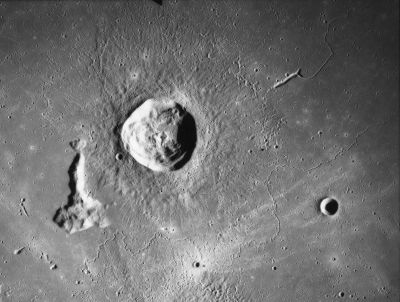Delisle
Contents
Delisle
|
Lat: 29.97°N, Long: 34.68°W, Diam: 24.83 km, Depth: 2.42 km, [/R%C3%BCkl%2019 Rükl: 19], [/Stratigraphy Eratosthenian] |
Table of Contents

Apollo 15 AS15-M-2332 Delisle is the main crater near the center, with [/Mons%20Delisle Mons Delisle] to its lower left. Below Delisle, the tiny crater at the center of the area dusted with light colored ejecta is 2-km diameter [/Samir Samir], with even tinier [/Louise Louise] by its side (on the east). [/Rima%20Diophantus Rima Diophantus] winds across the frame from a series of small pits below [/Mons%20Delisle Mons Delisle] to the middle right margin. The shadowed 6-km circular crater below it is [/Diophantus Diophantus] B. In the upper right, a separate rille, [/Rima%20Delisle Rima Delisle], exits an odd elongated trench.
Images
LPOD Photo Gallery Lunar Orbiter Images Apollo Images
Maps
([/LAC%20zone LAC zone] 39B2) LAC map Geologic map LM map LTO map
Description
Elger
([/IAU%20directions IAU directions]) DELISLE.--A larger and more irregularly-shaped object than [/Diophantus Diophantus], 16 miles in diameter, with loftier and more massive walls, and an extensive but ill-defined central hill. There is an evident break in the northern border. A triangular mountain on the S.W. and a winding ridge running up to the N. wall are prominent features at sunrise, as are also the brilliant summits of a group of hills some distance to the W.N.W.
...
[/Mons%20Delisle Delisle Beta]. A curious club-shaped mountain on the S.W. of Delisle, nearly 4,000 feet in height.
...
S. of Delisle there is a tolerably bright spot on the site of some hills.
Wikipedia
Additional Information
- IAU page: Delisle
- Depth data from [/Kurt%20Fisher%20crater%20depths Kurt Fisher database]
- Pike, 1976: 2.42 km
- Arthur, 1974: 2.56 km
- Westfall, 2000: 2.42 km
- Viscardy, 1985: 2.55 km
- Cherrington, 1969: 2.4 km
- Indefinite central peak 0.64 km high, according to reading of LTO 39B2 chart by Kurt Fisher.
- Delisle and the tiny bright crater to its south ([/Louise Louise] or [/Samir Samir]??) are thermal anomaly craters, implying youthful ages - [/Moore%20et%20al%2C%201980 Moore et al, 1980]
- TSI = 25, CPI = 20, FI = 20; MI =65 [/Smith%20and%20Sanchez%2C%201973 Smith and Sanchez, 1973]
Nomenclature
- Named for Joseph-Nicolas Delisle (4 April 1688 - 1768), a French astronomer. He created his own observatory in the palace of Cluny, later made famous by Charles Messier.
- According to [/Whitaker Whitaker] (p. 218), the name for this crater was introduced by [/Schr%C3%B6ter Schröter] in the form de l'Isle. Most later observers used the modern spelling, which was adopted into the IAU's [/Named%20Lunar%20Formations Named Lunar Formations] (1935).
LPOD Articles
Bibliography
- Bugiolacchi, R. et al (2011). NIR Spectral Investigation of the Delisle/Diophantus Crater Region by the SIR-2 Instrument – 42nd LPSC Conference (Mar), 2011.
- [/A%20Portfolio%20of%20Lunar%20Drawings A Portfolio of Lunar Drawings] (Harold Hill), pages 72, 73.
J-N Delisle in the Sourcebook Project (William R. Corliss)
- In Mysterious Universe, a handbook of astronomical anomalies (1979) :
- Page 73: The Blunted Cusp Effect and Terminator Irregularities (at planet Mercury) (Dale P. Cruikshank, Strolling Astronomer, 1963). Note, in this article, Delisle is mentioned as de l'Isle. There's quite a lot of names in this article: Schroeter, Antoniadi, Burton, Noble, Franks, Trouvelot, Denning, Fournier (G. and V.), Schiaparelli, Lambert (because of his cosine law of diffuse reflection), de l'Isle, Wegner, Dollfus, Lyot, Camichel, Johnson, Smith, and Haas. The odd appearance of planet Mercury (as seen through a telescope) must have been a most important subject in those days...
[/Alphabetical%20Index Named Features] -- Prev: [/Delia Delia] -- Next: [/Mons%20Delisle Mons Delisle]
This page has been edited 1 times. The last modification was made by - tychocrater tychocrater on Jun 13, 2009 3:24 pm - afx3u3